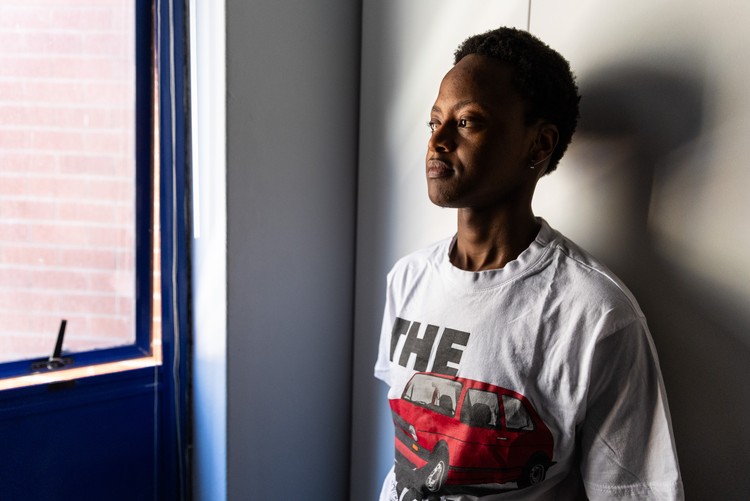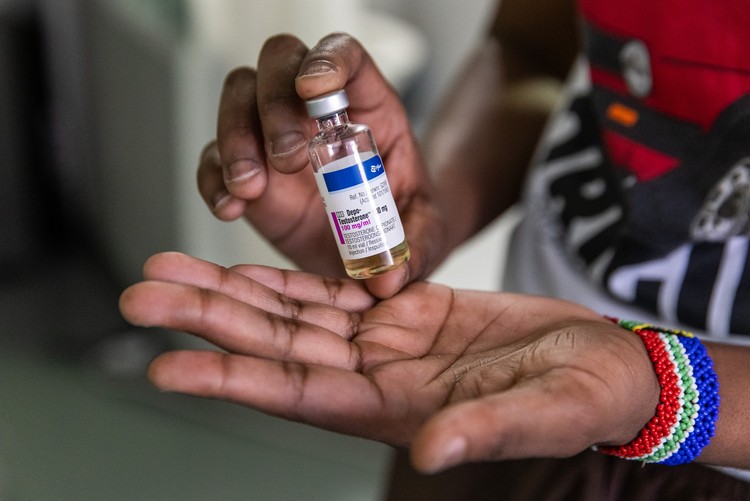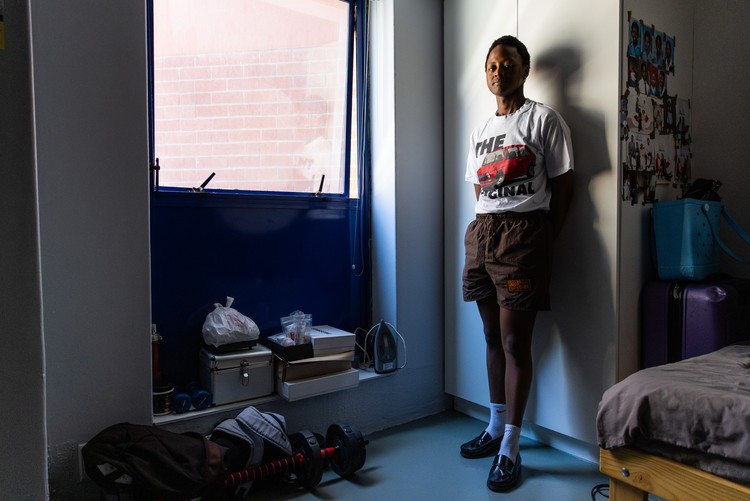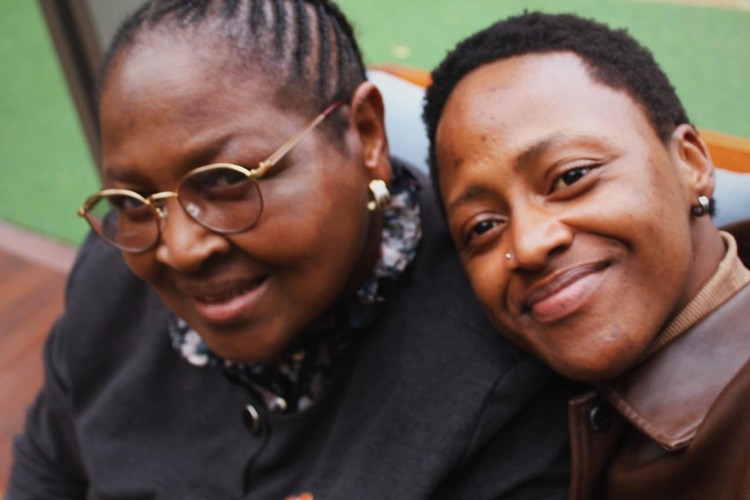“I can run, I feel free”: How government-funded hormones changed Lilita Singata’s life
Gender-affirming healthcare can be life-saving, but access is limited
Lilita Singata has been on testosterone for two years. He gets it for free from a local government clinic. Photos: Ashraf Hendricks
Growing up in KwaZulu-Natal, Lilita Singata thought he would never be able to transition.
As he went through puberty, he started to hate his female body. He lacked confidence and would dress in baggy clothing to hide his body.
“It was always a thing, that I wished I could actually transition,” Singata said. “But in my head, I was like, no it’s not possible, because my mom won’t accept it, and how am I going to do that? That must be very expensive.”
In 2022, social media enabled him to connect with transgender people from around the world. He came across an American trans man on Instagram. This showed him that not only do trans men exist, but that they lead happy lives. A friend later encouraged Singata to stop waiting.
“He was like, what are you waiting for,” Singata said. “Why don’t you just do the research and do it now?”
Singata visited the WITS Reproductive Health and HIV Institute (RHI) Transgender Clinic in Bellville, Cape Town, which provided him with free testosterone. Today, Singata has been on testosterone for over two years. He gets it free from a government clinic, self-administering an injection every two weeks.
Singata, a student at the Cape Peninsula University of Technology, said being on testosterone has helped with his confidence and body dysmorphia. “The more my body changes and becomes more masculine, the more comfortable I get,” Singata said. “It’s made life easier. My body feels lighter. I can run. I feel free.”
Singata self-administers testosterone with an injection every two weeks.
Access to gender-affirming care
One study on the mental health of LGBT+ people in Southern Africa found that more than 44% of trans men and 45% of trans women surveyed had thought about committing suicide at least once in their lives. More than half of trans men and women were depressed.
According to Olivia Welte, a research assistant at the Desmond Tutu Health Foundation’s LGBT+ division, rejection and exclusion from family and community can lead to school dropouts, homelessness, vulnerability to physical and sexual violence, and harmful substance use. Seeking HIV and STI testing and treatment can also be especially difficult for LGBT+ people because of the fear of facing stigma.
Gender-affirming care, like hormonal and surgical interventions, alongside other psycho-social mental health interventions, can be life-saving for trans people. But treatment can be incredibly difficult to access.
“The more my body changes and becomes more masculine, the more comfortable I get,” Singata says.
Many specialised clinics that provided services for transgender people, like those run by WITS RHI, where Singata first got testosterone, closed earlier this year due to USAID funding cuts. In the private sector, hormonal and surgical care is incredibly expensive. In the public sector, there are huge waiting lists and a shortage of trained specialists. Only a few public facilities provide these treatments, and they are concentrated in major urban centres.
Due to waiting lists, surgical interventions are almost impossible to access in government facilities. Testosterone and estrogen are provided free in the public sector but only through specialised services, usually provided only at hospitals. Groote Schuur hospital in Cape Town is one of few public facilities that provides gender-affirming care.
One must first be referred by a primary health care provider. This means asking one’s private doctor, or a nurse at a local clinic for a referral. Then one is placed on a waiting list for several months to see a psychiatrist, to then be referred to see an endocrinologist, after another few months, who can prescribe the hormones. Once one has a prescription, one can collect the medicine free of charge at a clinic or government pharmacy.
“People will go a long time without access to healthcare, and without knowing where they can get this healthcare,” said Welte. The DTHF LGBT+ division recently opened a trans health service at Groote Schuur Hospital, providing gender-affirming care to people who were getting services from clinics that have closed due to funding cuts.
The organisation also supports a community outreach and engagement programme that provides safe spaces for LGBT+ individuals. They have established ten Safe Space groups, including a Trans Safe Space.
Pictures from Singata’s childhood on his cupboard.
The road to acceptance
Earlier this year, Singata told his story in a documentary short film he directed, called “Mirror Him: A Transition Documentary.” The project was funded by the Desmond Tutu Health Foundation’s (DTHF) LGBT+ division.
The documentary shows Singata’s mom, Thokozile, struggling to accept that he is trans. But she has made big strides since then. In October, she spoke at an event hosted by the DTHF in Khayelitsha, where she said that although she still did not understand everything about her son’s journey, she was learning and would be there to support him.
Singata says that the DTHF’s services have helped his mom’s heart “melt”. Brochures, pamphlets and conversations with doctors and nurses have helped Thokozile understand his identity.
He says his mom’s acceptance means everything to him. “I didn’t want to lose her. I need her,” he said. “Being a transgender person doesn’t mean that you should lose your family. It doesn’t mean that they should disown you.”
Transgender people in South Africa are highly likely to experience verbal harassment or ridicule because of their gender expression. These experiences are draining, Singata said. But seeing other trans men on social media go through similar challenges and still lead happy, successful lives helps him stay hopeful.
“A lot of people in South Africa … don’t understand the whole transgender experience,” Singata said. Even before his transition, Singata faced harassment. Back home, kids would call him names because of the way he dressed. Since transitioning, he’s had to cope with disrespectful or invasive comments about his identity from strangers, family members, and friends.
When making the documentary, Singata thought of other black, trans-masculine people who might watch it. “I just wanted them to see it’s possible,” he said. “Even with these challenges, we’re still here. We exist, and we’re allowed to exist.”
Lilitha with his mother, Thokozile, who has at first struggled to accept his gender identity, but has made big strides since then. Photo supplied.
Support independent journalism
Donate using Payfast

Don't miss out on the latest news
We respect your privacy, and promise we won't spam you.
© 2025 GroundUp. This article is licensed under a Creative Commons Attribution-NoDerivatives 4.0 International License.
You may republish this article, so long as you credit the authors and GroundUp, and do not change the text. Please include a link back to the original article.
We put an invisible pixel in the article so that we can count traffic to republishers. All analytics tools are solely on our servers. We do not give our logs to any third party. Logs are deleted after two weeks. We do not use any IP address identifying information except to count regional traffic. We are solely interested in counting hits, not tracking users. If you republish, please do not delete the invisible pixel.





